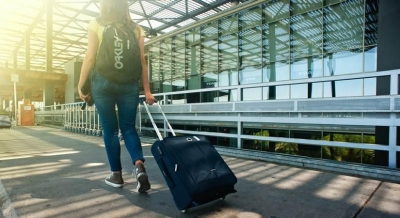Sustainable suitcase swaps
By IANS | Updated: May 24, 2022 11:30 IST2022-05-24T11:18:03+5:302022-05-24T11:30:07+5:30
New Delhi, May 24 People are eager to travel again now that travel restrictions have been lifted. While ...

Sustainable suitcase swaps
New Delhi, May 24 People are eager to travel again now that travel restrictions have been lifted. While family vacations to the beach and romantic weekend getaways are back on the agenda, many travellers are also thinking more critically about the environmental impact of their trips. Indeed, according to a recent sustainable travel study commissioned by Booking.com, travelling more sustainably is important to 94 percent of Indian travellers.
Furthermore, 68 per cent of Indian travellers say that recent climate change news has motivated them to make more environmentally friendly travel choices.
However, travelling more sustainably begins before even leaving the house, with a more deliberate approach to packing the proverbial suitcase.
Travellers can reduce their personal travel footprint by carefully considering the contents and packing a little lighter.
Less weight means planes burn fuel more slowly, and with 36 percent of Indian travellers choosing to travel lighter in the last year, it's a positive step toward reducing carbon emissions associated with their trips. Even those who travel to their destinations by train, car, bike, boat, or foot can bring a few mindful essentials with them to help them reduce their environmental impact.
With that in mind, and as Indian travellers return to the road this summer, Booking.com - one of the world's largest online travel agencies shares a helpful packing guide with more mindful must-haves for this year's sustainable suitcase.
Trusty eco-friendly toiletries
In recent years, the contents of bathroom cabinets have undergone an eco-makeover, with more sustainable alternatives to non-recyclable plastic toiletries now available. There are game-changing shampoo and conditioner bars that don't use plastic packaging and won't weigh down a case for those who want to pack lighter and more sustainably.
Consider the sustainable credentials of the SPF when planning a trip to the water, especially if you will be visiting and swimming in areas with sensitive ecosystems such as coral reefs. Sunscreen's chemicals can be harmful to the ocean and aquatic life, so make sure it's labelled 'reef-safe' before packing it.
Similarly, some chemicals in mosquito repellent can be harmful to the environment, so consider switching to a natural option that uses citronella or peppermint to keep the bugs at bay. These simple changes are an excellent option for the 58 per cent of Indian travellers who believe that conserving wildlife and natural habitats in their chosen destinations is an important part of sustainable travel.
Embrace zero waste
It's no secret that limiting single-use plastic is one of the most difficult environmental challenges we face, with an estimated 91 per cent of plastic currently not recycled and ending up in the ocean or landfill. Travellers can make some simple swaps when packing by considering what reusable items they might need on their trip.
Many global travellers are already considering sustainable dinnertime swaps, with 75 per cent of Indian travellers planning to be more conscious about their food consumption while travelling, such as choosing more vegan or vegetarian options or eating organic/locally sourced foods. But it can also be more than what's on the plate. If you're eating at a food market or eating street food, bring some bamboo cutlery with you to avoid the single-use items on offer.
Travellers can also make environmentally friendly swaps while staying hydrated. Instead of buying single-use plastic water bottles while travelling, consider a stainless steel alternative that can be used for years and should be kept topped up with drinking water whenever possible.
There are eco-friendly options for those travelling to places where the water may not be safe to drink, as well as those relying on natural water sources on camping and hiking trips. Consider using water purification tablets or a UV-light purifier, which is a small, lightweight wand-like device that emits UV light to kill bacteria, viruses, and protozoa
Disclaimer: This post has been auto-published from an agency feed without any modifications to the text and has not been reviewed by an editor
Open in app